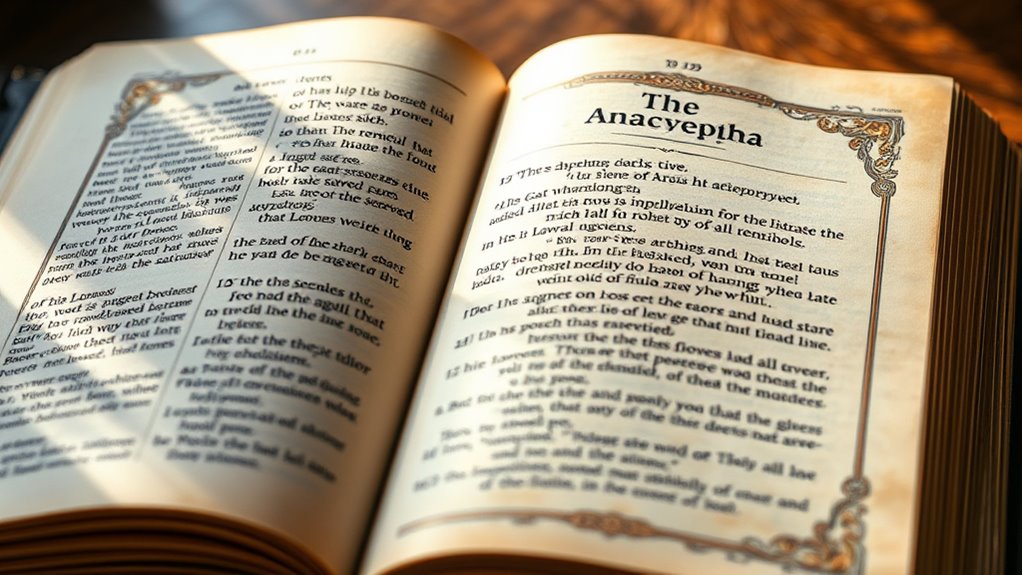The Apocrypha refers to ancient writings included in Catholic Bibles but not in Hebrew or most Protestant versions. These texts, written between the 3rd century BCE and 1st century CE, hold historical and theological significance in Catholic and Orthodox traditions. While many Protestants exclude them from their canon due to debates over authority, understanding their role offers valuable insight into Christian history and beliefs. If you explore further, you’ll discover how the Apocrypha shapes different Christian practices and teachings.
Key Takeaways
- The Apocrypha includes ancient writings found in Catholic Bibles but not in Protestant or Hebrew Scriptures.
- These texts were written between the 3rd century BCE and 1st century CE, influenced by Jewish thought.
- Catholic Bibles consider the Apocrypha as Deuterocanonical, meaning they are officially part of the canon.
- Protestant Bibles generally exclude the Apocrypha due to differences in canonical standards and authority.
- The inclusion of the Apocrypha reflects historical, theological, and tradition-based debates across Christian denominations.
Defining the Apocrypha and Its Origin

The term “Apocrypha” refers to a collection of ancient writings that are included in some versions of the Catholic Bible but are not considered part of the official Hebrew or Protestant canon. These texts have been at the center of canonical disputes and doctrinal debates for centuries, as different Christian traditions have different views on their authority. The Apocryphal books date back to the intertestamental period and reflect diverse theological perspectives. Their inclusion in Catholic Bibles stems from historical decisions made by early Church councils and the Septuagint translation. While Protestants largely exclude these writings from their canon, Catholics regard them as useful for instruction and spiritual growth, leading to ongoing discussions about their place within Scripture. Understanding the canon is essential to grasp the significance and varying acceptance of these texts across Christian denominations. In recent years, scholarly interest in the historical context of the Apocryphal writings has increased, prompting further examination of their origins and influence on biblical tradition. Recognizing the diverse theological perspectives found in these texts helps to understand their impact on religious thought.
Historical Context of the Apocryphal Books

Understanding the historical context of the Apocryphal books helps explain why these writings became part of the Catholic canon. During the period when biblical translations were being made, many ancient manuscripts of Jewish writings circulated, some containing texts now considered Apocryphal. These books were written between the 3rd century BCE and the 1st century CE, reflecting Jewish thought and history of that time. As translations of the Hebrew Scriptures expanded, the Apocrypha appeared in Latin and Greek versions, such as the Septuagint, which was widely used in early Christian communities. Their inclusion in these ancient manuscripts influenced the development of Christian canon, making them integral to Catholic tradition. This historical context shows how the books gained acceptance within the broader biblical narrative. Additionally, the best Vegetables to Eat on a Keto Diet were often incorporated into early Christian diets, further embedding these texts into cultural practices of the time. Understanding the ancient manuscript traditions helps clarify how these texts gained prominence and acceptance in religious settings.
Differences Between Catholic and Protestant Bibles

The inclusion or exclusion of certain books defines how Catholic and Protestant Bibles differ. Catholic Bibles include the Deuterocanonical books, while Protestant Bibles typically do not. Translation differences also play a role; Catholic editions often use translations that incorporate the original Greek and Latin texts, whereas Protestant translations may emphasize the Hebrew texts. These differences influence how scripture is understood and presented. Additionally, liturgical variations impact how these Bibles are used in worship, with Catholic liturgy frequently referencing the Deuterocanonical books, shaping their significance. As a result, these variations in translation and liturgical use create distinct religious experiences and interpretations, highlighting the ongoing divergence between Catholic and Protestant approaches to scripture. The canon of scripture is a fundamental aspect that distinguishes these traditions and influences their theological perspectives. Furthermore, the translation differences often reflect broader theological and doctrinal distinctions that have developed over centuries.
The Canonical Status of the Apocrypha in Various Christian Traditions

Different Christian traditions recognize the Apocrypha’s authority in varied ways, shaping their biblical canons accordingly. You’ll see the Catholic Church fully includes these texts, while Protestants typically exclude them from their canon. The Orthodox Church, however, considers some of these writings authoritative based on historical acceptance criteria. Additionally, debates over the influence of AI on music creation and how emerging technologies can impact religious and cultural expressions are increasingly relevant in theological discussions. These differing perspectives illustrate how biblical canons are shaped by theological and historical factors across traditions. Understanding these distinctions helps clarify the canonical status of the Apocrypha within each tradition. Recognizing the cultural intelligence behind these varying views can enhance interfaith dialogue and foster mutual respect among different Christian communities.
Catholic vs. Protestant Views
The canonical status of the Apocrypha varies sharply between Catholic and Protestant traditions, leading to differing views on its importance and authority. Catholics consider these books part of Scripture, giving them biblical authority and integrating them into their Scripture interpretation. In contrast, Protestants generally view the Apocrypha as non-canonical, seeing it as useful but not authoritative for doctrine. These differences influence how each tradition approaches the Bible’s authority and how they interpret Scripture. The table below highlights key distinctions:
| Aspect | Catholic View | Protestant View |
|---|---|---|
| Canonical Status | Books are Scripture | Books are Apocrypha, non-canonical |
| Biblical Authority | Equal to other Scripture | Not authoritative for doctrine |
| Scripture Interpretation | Includes Apocrypha | Excludes from authoritative Scripture |
Orthodox Inclusion Criteria
In examining the Orthodox Christian tradition, you’ll find that its approach to the Apocrypha’s canonical status is shaped by specific inclusion criteria rooted in early church history and theological consensus. The Orthodox Church relies on canon formation that emphasizes texts with strong historical and spiritual authority, often aligned with the Septuagint. Textual authenticity plays a crucial role, as the church considers whether the books were widely accepted and transmitted reliably through early Christian communities. Unlike other traditions, the Orthodox include certain apocryphal books based on their use in liturgy and tradition, rather than strict formal criteria. This approach ensures that the canon reflects both historical continuity and theological significance, maintaining the apocryphal texts’ place within their broader understanding of Scripture.
Historical Acceptance Variations
The status of the Apocrypha varies considerably among Christian traditions, reflecting differing historical acceptance and criteria for canonical inclusion. Some traditions, like the Catholic Church, accept these books based on manuscript authenticity and longstanding tradition. Others, such as Protestant groups, generally exclude them, citing concerns over translation variations and their late recognition in certain regions. Historical acceptance shifted over centuries, influenced by debates over manuscript authenticity and theological consistency. Translation variations also played a role, as different versions of the Bible included or omitted these texts, impacting their perceived authority. Additionally, Hopi Tribe has begun to influence how religious texts are studied and interpreted, offering new insights through technological analysis. Ultimately, these differences highlight how cybersecurity vulnerabilities, manuscript scrutiny, and translation choices shaped the inclusion or exclusion of the Apocryphal books across Christian traditions.
Key Books Included in the Catholic Apocrypha

Several key books are included in the Catholic Apocrypha, distinguishing it from other biblical collections. These texts are recognized for their role in shaping the biblical canon and holding religious authority within Catholic tradition. They provide historical context and spiritual insights that complement the canonical books. The main texts are listed below:
| Book Name | Description |
|---|---|
| Tobit | Emphasizes prayer and righteousness |
| Judith | Highlights faith and courage |
| Wisdom of Solomon | Explores wisdom and divine justice |
These books are considered part of the biblical canon for Catholics, reinforcing their religious authority and spiritual significance. Their inclusion reflects the Catholic Church’s view of the Apocrypha as valuable, historically rooted texts.
Theological Significance of the Apocryphal Texts

The apocryphal texts hold significant theological value within Catholic tradition because they deepen understanding of divine justice, wisdom, and faith. They often contain spiritual symbolism that encourages reflection on moral virtues and divine providence. These writings influence doctrinal debates by offering perspectives on prayer, resurrection, and God’s mercy, enriching theological discussions. By exploring these texts, you gain insight into the spiritual mindset of ancient Jewish communities and early Christians. They serve as a bridge between sacred Scripture and lived faith, emphasizing themes of righteousness and divine intervention. While not always considered equal to canonical texts, the apocryphal books contribute to a fuller picture of God’s work and human response, fostering a richer spiritual and doctrinal understanding within Catholic theology. Additionally, understanding the context and themes of these texts can enhance spiritual growth and deepen one’s appreciation for the diverse ways faith has been expressed throughout history. Recognizing the historical context of these writings helps clarify their significance and role in shaping theological thought over centuries. Exploring these texts also provides insights into cultural influences that shaped early religious beliefs and practices. Moreover, their presence in the Catholic canon underscores their importance in understanding the development of biblical tradition and theological diversity.
Reasons for Inclusion and Exclusion in Different Bibles

Different Bibles include or exclude certain texts based on historical acceptance, canonical standards, and doctrinal beliefs. You’ll notice these choices shape how each tradition views the authority of these writings. Understanding these reasons helps clarify why some texts are considered Scripture while others are not. For example, the implementation of fraud detection techniques in transaction processing influences how merchants and ISOs manage risks associated with questionable transactions.
Historical Acceptance Variances
Have you ever wondered why some Bible editions include the Apocrypha while others leave it out? The answer lies in historical acceptance variances shaped by canonical disputes and differing views on scriptural authority. Early Christian communities debated which texts were divinely inspired, leading to diverse lists of accepted books. The Catholic Church officially recognized the Apocrypha in the Council of Trent (1546), affirming its scriptural authority, while Protestant groups largely excluded these writings, citing concerns over canonical disputes. These differing traditions reflect how historical context and doctrinal priorities influenced which books gained acceptance. Over time, these variances created distinct biblical canons, shaping how different Christian traditions view the status of the Apocryphal books today.
Canonical Criteria Differences
What are the key reasons that some biblical books are included or excluded in various editions? Primarily, differences stem from canonical criteria like textual authenticity and canonical disputes. Authorities evaluate whether a book aligns with established doctrinal standards and historical accuracy. Variations often arise because certain texts lack widespread acceptance or have disputed origins. For example, some books are excluded due to questions about authorship or authenticity. Conversely, texts accepted by tradition and early church councils are included. The table below highlights key factors influencing these decisions:
| Criterion | Books Included | Books Excluded |
|---|---|---|
| Textual authenticity | Generally accepted | Disputed origins |
| Canonical disputes | Recognized universally | Contested texts |
| Historical usage | Widely used in worship | Limited or no use |
| Doctrinal consistency | Aligned with doctrine | Contradictory content |
Theological and Doctrinal Impact
Theological and doctrinal considerations play a significant role in determining which books are included or excluded from various editions of the Bible. Your understanding of divine inspiration and doctrinal authority influences these decisions. A deeper comprehension of consecration in the Bible can shed light on how certain texts are valued based on their sacred significance. Moreover, end-of-life care principles highlight the importance of respecting individual beliefs and values in shaping the canon. 1. Books with strong historical support are often included to reinforce doctrinal authority. 2. Texts questioning core doctrines are typically excluded to maintain doctrinal consistency. 3. Different traditions prioritize certain writings based on their view of divine inspiration. 4. The inclusion or exclusion shapes the theological framework guiding faith and practice. These choices impact how believers interpret Scripture, emphasizing certain doctrines while downplaying others. Additionally, scriptural canon formation often reflects the theological priorities of specific faith communities, influencing which writings are deemed authoritative. Ultimately, the inclusion of specific books reflects what a tradition sees as divinely inspired and authoritative for faith and doctrine.
The Debate Over the Authority of the Apocrypha

The debate over the authority of the Apocrypha has persisted for centuries, dividing Christian traditions on whether these books should be considered Scripture. Central to this debate is the question of the biblical canon—whether these writings belong among the recognized sacred texts. Those who support their inclusion argue that the Apocrypha holds religious authority and offers valuable spiritual insight, especially in Catholic tradition. Conversely, many Protestant groups reject their authority, citing a lack of clear endorsement from early church leaders and the absence of the books from Hebrew Scripture. This disagreement influences how different Christian communities view the legitimacy of the Apocrypha’s teachings and their role in faith and practice. The debate reflects deeper issues about authority, tradition, and the formation of Scripture.
How the Apocrypha Influences Christian Thought and Practice

The Apocrypha shapes Christian thought and practice by providing teachings and moral lessons that many traditions incorporate into their spiritual lives. It influences how you understand Biblical Inspiration and supports Faith Formation by illustrating virtues like courage, piety, and perseverance. Here are four ways it impacts you:
The Apocrypha enriches faith with moral lessons, historical insights, and spiritual virtues shaping Christian practice.
- It offers historical context, enriching your comprehension of biblical events.
- It inspires moral lessons that guide ethical behavior.
- It influences liturgical practices and prayers in some Christian traditions.
- It deepens your understanding of faith through stories of perseverance and divine intervention.
- It also facilitates Hackathons, which foster collaboration and innovative thinking that can be applied to theological studies and community outreach efforts.
Frequently Asked Questions
Are the Apocryphal Books Considered Inspired Scripture by All Christian Denominations?
You might wonder if all Christian denominations consider apocryphal books inspired scripture. The answer is no; canonical differences exist, with Catholics including these books in their Bibles, while most Protestant groups do not. These differences have significant theological implications, influencing doctrines and teachings. Hence, whether apocryphal books are deemed inspired depends on your denomination’s tradition, impacting how you interpret Scripture and understand faith.
How Do the Apocryphal Texts Compare to the Canonical Books in Content and Style?
Imagine you’re scrolling through a vintage playlist—some songs are classics, others are more experimental. The apocryphal texts differ from canonical books in literary style and theological themes. They often feature more elaborate storytelling and historical details, but sometimes lack the consistency of the canonical scriptures. You may find their theological ideas intriguing but less aligned with the core messages found in the officially recognized texts.
What Historical Events Led to the Inclusion or Exclusion of Certain Books?
You see, historical events like the influence of the Quran and the Jewish canon shaped which books were included or excluded. When Christian scholars debated, they considered these texts’ authenticity and theological consistency. The Jewish canon’s development, along with Islamic influences, led to some writings being accepted in Catholic Bibles and others being left out. This process reflects evolving religious beliefs and historical contexts that shaped scripture’s formation.
Do the Apocryphal Writings Influence Modern Christian Liturgy or Teachings?
Imagine a quiet river shaping the landscape—apocryphal writings subtly influence modern Christian liturgy and teachings. During theological debates, these texts often serve as references, shaping perspectives and practices. While they don’t hold the same authoritative weight as canonical scriptures, their themes echo through prayers, sermons, and religious traditions, enriching spiritual life and fostering dialogue within the church community. Their impact remains a quiet but persistent current in Christian worship.
How Do Different Christian Groups Interpret the Moral and Theological Messages of the Apocrypha?
You’ll find that different Christian groups interpret the moral and theological messages of the Apocrypha based on their biblical canon and theological perspectives. Catholics view these books as valuable for moral guidance and faith, while Protestants often see them as non-canonical, emphasizing scripture alone. Orthodox Christians generally accept them, integrating their teachings into their spiritual understanding. Your interpretation depends on your tradition’s approach to the biblical canon and theological outlooks.
Conclusion
Think of the Apocrypha as a hidden treasure chest—some Christian traditions value its contents deeply, while others see it as a secondary relic. Just like explorers debate whether to open every chest they find, believers wrestle with its authority. Whether you view these books as sacred or historical, understanding their place helps you navigate the rich tapestry of Christian faith, revealing that the journey of faith often involves exploring both the known and the mysterious.










